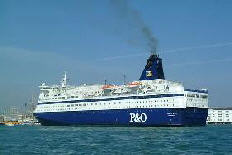|
Green groups describe the plan as clearly inadequate and are demanding far tougher sulfur limits. But the shipping industry is pressing for a complete change in policy to one based on flue gas desulfurization combined with emissions trading.
Ships burn high sulfur fuel that is responsible for sulfur dioxide emissions. Regionally, these emissions contribute to acid rain, which can pollute waterways and damage forests and crops.
The Swedish NGO Secretariat for Acid Rain and fellow groups argue that the European Union must aim to cut ship sulfur emissions by 80 percent between 2000 and 2010, whereas the Commission's proposal would deliver less than 10 percent. This can only be achieved by taking bold unilateral steps fuel sulphur limits agreed through the International Maritime Organization, they say.
Under the Commission's proposals a main provision of the draft directive would be a 1.5 percent sulfur limit applied only in three internationally agreed sulfur control areas. The NGOs want instead a 0.5 percent sulfur limit on fuels burned anywhere within 200 miles of EU coasts and an even stricter 0.2 percent limit within 12 miles.
Shipping industry groups, such as the European Community Shipowners Association, oppose any such unilateral EU action and believe fuel sulfur curbs on the scale demanded by green groups would contravene the International Law of the Sea.
Meanwhile, a group set up to coordinate industry positions on the law is proposing a radically different approach based on cleaning sulfur from emissions and introducing trading of emission allowances.
Shipping Emissions Abatement and Trading believes the two options could achieve the 10 percent emissions cut sought by the Commission at about €220 million less cost than curbs on sulfur in fuel.
Alternatively, it reckons spending the same amount of money could yield something like a 50 percent cut in emissions. In addition, seawater scrubbing of sulfur would remove 80 percent of particulate emissions, the shipping organization claims.
The group is disappointed that the Commission did not take up these ideas in its legislative proposal but appears ready to fight on. The European Parliament's rapporteur on the directive, Heidi Hautala, is being touted as a possible ally. Though Hautala has called for tough legal limits on sulfur in fuel, she is also "very interested in trading," according to one industry source.
Originally published in cooperation with ENDS Environment Daily, Europe's choice for environmental news. Environmental Data Services Ltd, London. Email: envdaily@ends.co.uk
Top
|
